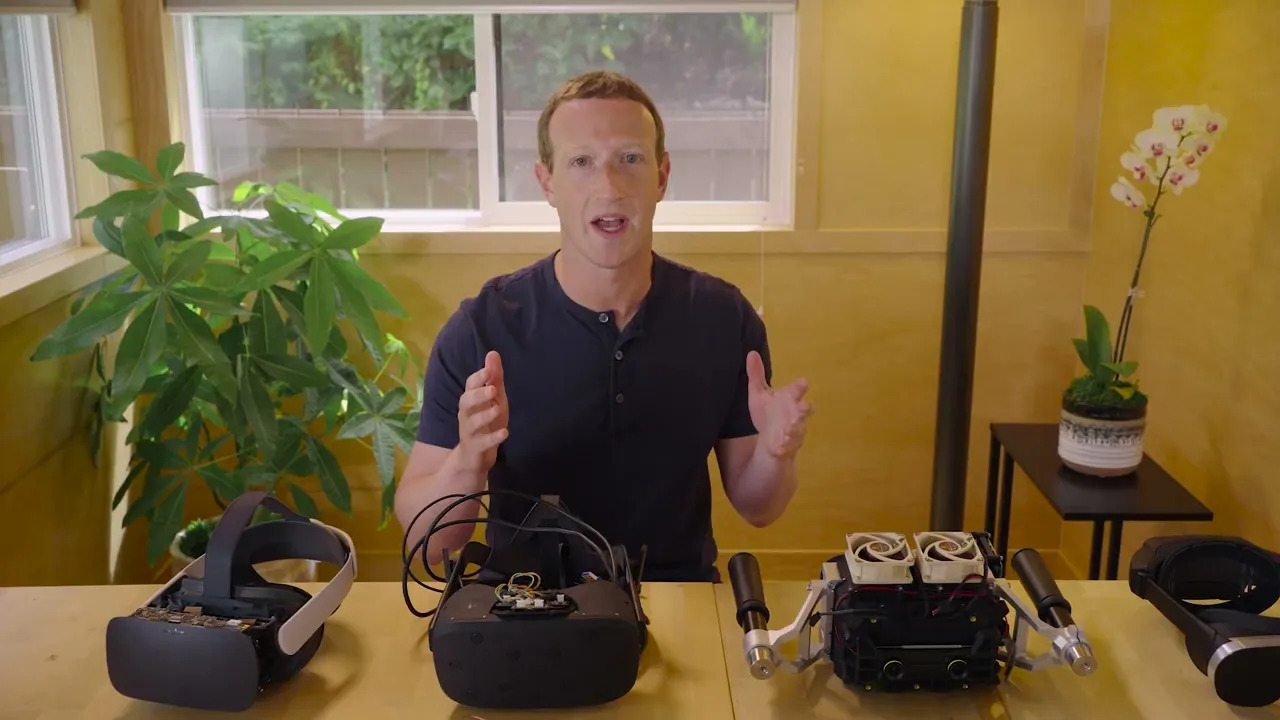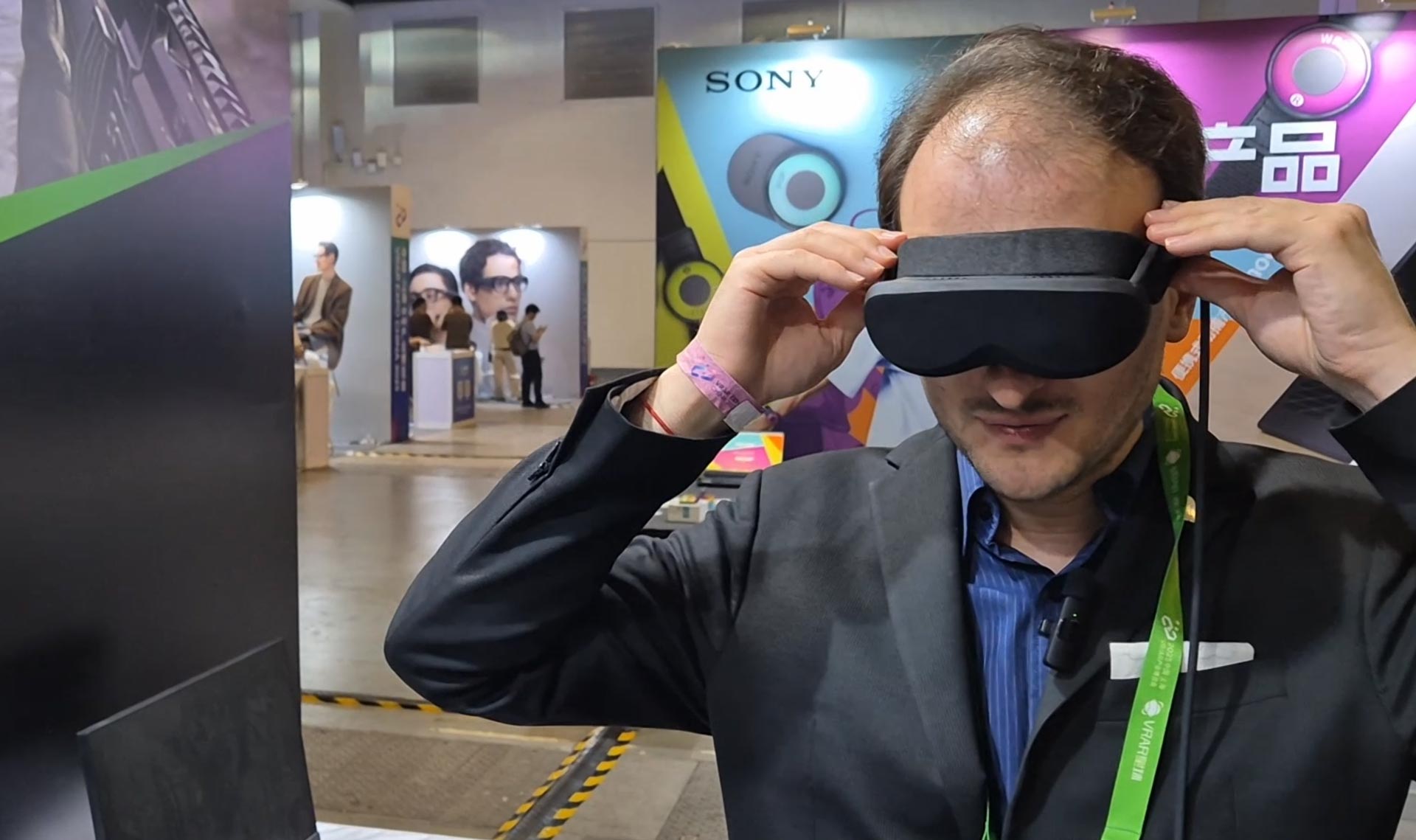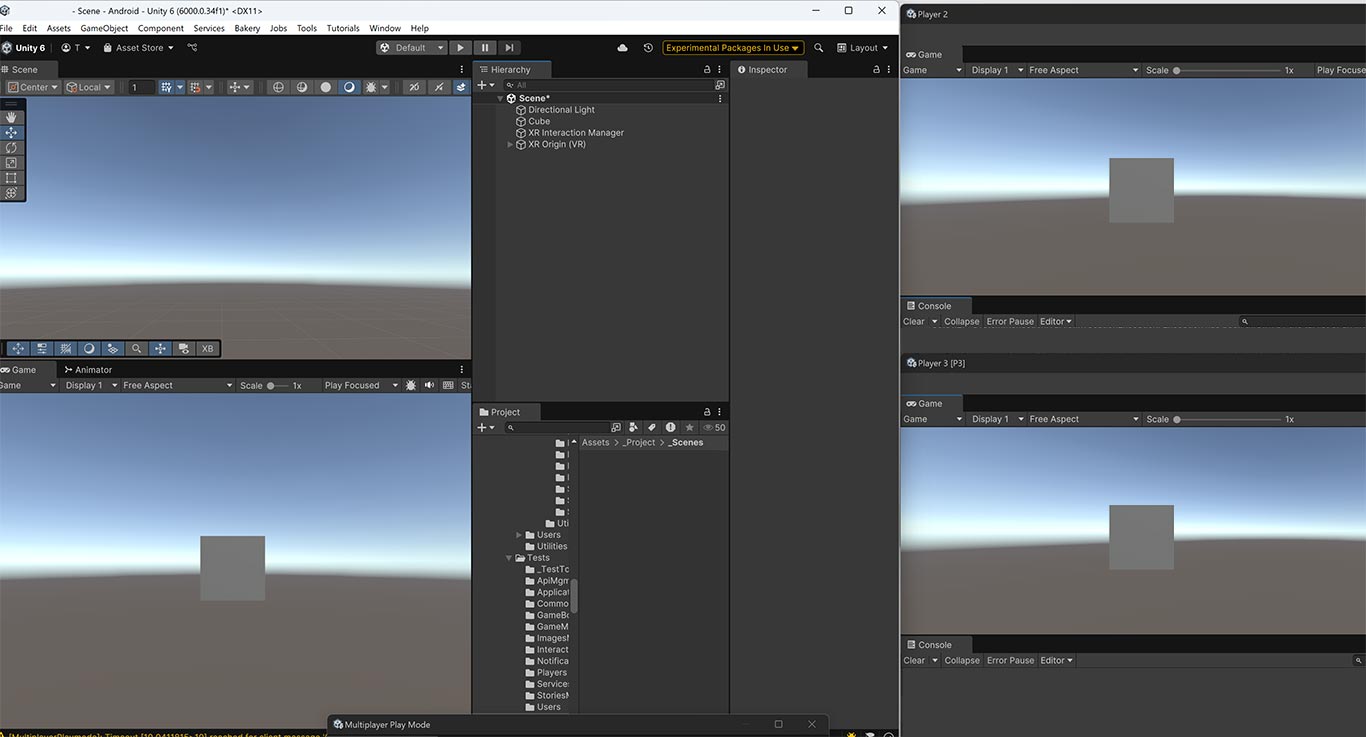The XR Week Peek (2022.06.27): Meta shows its R&D prototypes, Apple shows nothing as usual, and much more!
It’s hot and the drought is creating some issues here in northern Italy. But I had a nice weekend, plus I’ve been chosen by Onalytica as one of the top 5G+XR influencers on Linkedin, so I think of this and I stay happy.
Top news of the week

Meta showed prototype headsets from its R&D department
With a completely unexpected move, Meta has given us all a glimpse of some prototypes created by its R&D department. Mark Zuckerberg himself has performed this marketing push, in which he claims that the company is working hard to make sure that its headsets will be able to pass the “Visual Turing Test”, that is that the visuals they offer become indistinguishable from reality.
To perform this ambitious goal, Meta is trying to tackle four different problems (thanks to Road To VR for this summary):
- Varifocal: the ability to focus on arbitrary depths of the virtual scene, with both essential focus functions of the eyes (vergence and accommodation)
- Distortion: lenses inherently distort the light that passes through them, often creating artifacts like color separation and pupil swim that make the existence of the lens obvious.
- Retina resolution: having enough resolution in the display to meet or exceed the resolving power of the human eye, such that there’s no evidence of underlying pixels
- HDR: also known as high dynamic range, which describes the range of darkness and brightness that we experience in the real world (which almost no display today can properly emulate).
Zuck has presented four different prototypes, each one focused on a single one of these aspects. R&D works in tackling different problems separately, so they can learn everything they can about solving one, before trying to mix its solution with the solution of other concurrent issues. For every one of the four main themes, a headset solving it has been shown in the video.
- For Varifocal, there was Half-Dome, the headset we all already know
- For Distortion, it was shown a headset with wide FOV, very special lenses, and eye-tracking, that make sure that there are no distortions, no matter where your eyes are looking at
- For Retina Resolution, there was a device called Butterscotch, that was able almost to simulate 20/20 vision with a 55PPD pixel density. Of course, its FOV was restricted because there are not in the market displays with so many pixels and such a big size
- For HDR there was Starburst, an HMD able to deliver 20,000 nits, much more than the 1,000 ones of a commercial HDR TV. Thanks to it, it is possible to see a lit scene and see the illuminated part as quasi-realistic.
It is surprising how Meta details that actually, HDR is the thing bringing more realism to a scene, even more than resolution and FOV. Without HDR, you are conscious that you are seeing the world through a screen, while with actual HDR, you can feel the proper lighting of a scene, and it immediately becomes real and immersive. This is my biggest takeaway from these tests. This has been also confirmed by TESTED, which has been able to go hands-on with the headset and offer a very meaningful video about them (which I advise you all to watch).
After that, another device was shown: Holocake 2, a very compact headset looking like ski goggles, which is so light and comfortable thanks to the use of holographic pancake lenses. And then Meta also teased Mirror Lake, a series of concept images that “show what a complete next-gen display system could look like”. Mirror Lake includes holographic lenses, reverse passthrough (people can see your eyes when you wear it), varifocal, and eye-tracking in a single very lightweight device. It would be great if Meta managed to create a cool device of this kind.
You may wonder why Zuck has decided to pull out of this showcase. I think there are several good reasons for that:
- To show investors how the company is spending $10B every year on the metaverse;
- To show investors that Meta has a clear roadmap for hardware and software;
- To show everyone that internally Meta has headsets that can compete with everyone in the market (including Varjo)
- To show everyone that Meta is ready to compete with Apple.
It’s good that anyway Zuck didn’t want to hype anyone about these devices and claimed that they are for “the next years”, with some of them even projected for the second part of the decade.
More info (Zuckerberg introduces the R&D headsets)
More info (HDR is the key for realistic VR images)
More info (Meta talks about the Visual Turing Test)
More info (Butterscotch and Starbust prototypes)
More info (Mirror Lake concept headset)
More info (TESTED’s hands-on with the prototype headsets)
Other relevant news

We have lots of non-news about Apple’s XR efforts
The hype around Apple glasses is huge, and everything that gets shared about Apple and XR gets many views. That’s why this week we had a serious amount of articles that got shared that added no information about what we already know but got popular anyway.
For instance, the piece video on China Daily where Tim Cook says “I am incredibly excited about AR […] stay tuned and you’ll see what we have to offer” has become viral and everyone is talking about it, while actually, it doesn’t convey any info. We already knew that Tim likes AR and “what we have to offer” may also be a potato with an Apple brand costing $400. I mean, the smile of Tim Apple when he says the sentence makes you understand that he’s hinting at something cool, but we were already expecting cool stuff from Apple.
Then we have a new report from The Verge that says that the upcoming Apple visor is coming with an M2 chip (we knew that); Kuo saying that Apple will release its visor in January 2023 (we knew that); Apple AR glasses (not the headset, but the glasses) have now entered the design development stage and should release in 2024 (again, we knew). Useless news.
Something better has been reported by Tony Rogers hinting that Apple will make everything wireless and remove all the cables (which makes sense) and Cesar Berardini discussing the term Synthesized Reality that Apple is using in some patents and that it may use instead of the term XR (even if I don’t see the term “synthesized” become mainstream because it sounds bad).
So at the end of the day, you may read lots of posts and know the same things you knew before. This is the story of my life for half of the posts I read about Apple. If you want the same experience, click on the links here below.
More info (Tim Cook says to Stay Tuned — Upload VR)
More info (Tim Cook says to Stay Tuned — The Verge)
More info (Kuo envisions Apple Visor for 2023)
More info (Apple Visor could run Apple M2 processor)
More info (Apple glasses predicted for 2024)
More info (Tony Rogers on Apple and wireless devices)
More info (Cesar Berardini on Synthesized Reality)
Metaverse Standards Forum aims at setting standards for the metaverse
A good piece of news from the past week has been the creation of the Metaverse Standards Forum. This is a free association headed by Khronos Group, the consortium behind the OpenXR standard, which aims at creating standards for the future metaverse. The idea is that if the metaverse will require interoperability between different platforms, someone must work on the standards needed to make the various platforms communicate with each other. The Standards Forum aims at fostering a debate around these topics. Notice that this Forum is not meant to create the standards by itself, but to coordinate with existing associations so that these standards get created.
The Metaverse Standards Forum has already gathered many important players of the XR sector like Unity, Unreal Engine, Meta, Microsoft, Lamina 1, NVIDIA, and even other relevant companies like IKEA and Adobe. Some others, like Niantic, will probably join soon. Others, like Apple, will probably never join and develop their own standards.
I’m personally happy about this news because this means that these big companies will at least try to have a conversation about the open standards of the future metaverse. I’m not so sure that this initiative will succeed, but at least they’re trying and it is a positive thing. The Khronos Group already succeeded with OpenXR, so it has a good track in helping in creating standards. Fingers crossed.
More info (Metaverse Standards Forum — Road To VR)
More info (Metaverse Standards Forum — Upload VR)
More info (Metaverse Standards Forum — NVIDIA Blog)
News worth a mention

HTC launches Vive Flow Business Edition
HTC has just launched the Business Edition of the Vive Flow, the lightweight device meant for media consumption and wellbeing applications enjoyment. For this Business Edition the company will also supply a 3DOF controller to use with the device.
This controller is marketed as a “NEW controller”, but actually it is the same OLD controller of the original Vive Focus, a device from 2018. I think this is quite embarrassing, not as embarrassing as a spinning head with a headset on, but close.
You can now run SideQuest from within the Quest
A great piece of news comes from SideQuest, which finally managed to deliver the magic and create a version of its popular open store that runs inside the Quest. You still need a PC to install it, but then you can do everything from inside the headset, without having to mess with a PC connection every time. I’m unsure if you can install APKs from it (it was against the TOS some months ago), but for sure you can install applications from App Lab, mods, and levels of games. And this is a great thing for its usability.
More info (SideQuest from the Quest — Upload VR)
More info (SideQuest from the Quest — Reddit Post)
Pico Neo 3 Link gets reviewed by Upload
Upload VR has reviewed positively the Pico Neo 3 Link, the first true consumer-oriented competitor of the Quest 2. The VR magazine has anyway advised against buying it because Pico will probably release a new device in the next 12 months.
More info (SideQuest from the Quest — Reddit Post)
Rec Room keeps growing
Rec Room is one of the most popular virtual worlds, and it is growing very fast. Its latest metrics say that it amassed 75 million lifetime users since 2016, and it paid out more than $1 million for creators just during the first quarter of this year. One metric that impressed me is that it currently has more rooms than Apple has apps on the iOS App Store. This shows how the dynamics of technology have changed a lot and now 3D content creation platforms are becoming the place to be, and the place where to earn money.
As for the application itself, I’m also intrigued by the latest update that lets you draw whatever graphics you want with a pen and then apply it to clothes. This way it is possible to completely customize clothes in a very original way without the need of creating custom 3D models for them. It’s very cool.
More info (Rec Room stats)
More info (Rec Room clothes customization)
Some articles on the metaverse
As every week, here you are the most interesting articles I’ve found about the hot buzzword of the moment:
- Tencent, the Chinese Giant, has just opened a division dedicated to the metaverse. It will be composed of 300 people, which is not a big number, but it’s still a demonstration of commitment at a moment when the company is actually shrinking. It seems the division is a personal idea of the CEO Pony Ma;
- Neal Stephenson had been interviewed by VentureBeat about its new Web3 company Lamina1. He gives some interesting insights, like the fact that he doesn’t believe in the interoperability of EVERYTHING in the metaverse, but he thinks that interoperability will be a possibility that developers may choose to implement when they see value in it. Of course future experiences will be built with it in mind;
- A short post on Protocol highlights once more that just making a “metaverse installation” brings no big added value to a brand or a company. If you don’t think about a valuable user experience, an NFT exhibition is not going to make your brand appear any better;
- KPMG enters the metaverse too and says that the estimates of “trillions” related to the market size of the metaverse are even “conservative”. At this point, I wonder if “trillions” is related to dollars or bullshit.
More info (Tencent enters the metaverse)
More info (Neal Stephenson on the metaverse)
More info (Metaverse installations)
More info (KPMG on the metaverse)
Brad Lynch details its findings of Valve Deckard
Youtuber “Sadley, It’s Bradley” has written an article on Upload detailing all his findings about the upcoming Valve standalone VR headset, codenamed “Deckard”. It’s a series of things here and there, which don’t mean much to me apart from confirming that Valve is at least internally working on a standalone headset. But if you are a Valve fan, I guess you will love all the juicy details, like the fact that it may be based on a Qualcomm chipset or that there will be a room configuration in VR for it.
Read the story of Unplugged
I’ve read the story of how the videogame Unplugged has come to life and I liked it a lot. Seeing how a developer made a prototype and then because of the XR community found the support of a publisher thanks to which his game became a hit made me pretty happy. If you are a game developer, I’m sure you will appreciate it, too
Steam Summer Sale brings you VR games at a discounted price
That moment of the year when you have to give your money to Lord GabeN has come. Steam Summer Sale is running until July, 7th and it offers many interesting VR games at a discounted price. Even Half-Life: Alyx is 50% off!
Some news on content
- Satirical VR Shooter, The American Dream, is coming to Quest on June, 30th
More info (The American Dream)
Other news
Discover why WebGPU could be great to enable better WebXR experiences
Meta is hiring people from selected groups to perform testing on AI to guarantee it is inclusive for everyone
Zuck renames Facebook Pay into Meta Pay and aims at integrating into it a “Wallet For The Metaverse”
Lowe’s makes more than 500 3D models available for free to content creators
For the first time I can see a real footage of the Teslasuit haptic gloves
Rony Abovitz talks about Magic Leap 2 and clarifies that it has been made by the team of ML1, which now is almost all gone
News from partners (and friends)
Discover Beyond Inclusion Scholarship
CyberXR Coalition with the support of XR Bootcamp, XRSI, and Meta has created the Beyond Inclusion scholarship program to make the VR/AR industry more accessible and diverse. The idea is to offer 100% free scholarships to selected people from diverse and underrepresented backgrounds. These scholarships will be offered by XR Bootcamp, which already offers high-quality courses about XR. This is a good initiative to improve inclusion in our field, and I invite you all to check it out.
Learn more
Some XR fun
I want to try what he is trying
Funny link
Well, he’s got a point…
Funny link
Horizon Worlds is going great lately. More or less like Rec Room. More less than more…
Funny link
I have no comments on this.
Funny link
Donate for good
Like last week, also this week in this final paragraph I won’t ask you to donate for my blog, but to the poor people that are facing the consequences of the war. Please donate to the Red Cross to handle the current humanitarian situation in Ukraine. I will leave you the link to do that below.
Let me take a moment before to thank anyway all my Patreon donors for the support they give to me:
- Alex Gonzalez VR
- DeoVR
- GenVR
- Eduardo Siman
- Jonn Fredericks
- Jean-Marc Duyckaerts
- Reynaldo T Zabala
- Richard Penny
- Terry xR. Schussler
- Ilias Kapouranis
- Paolo Leoncini
- Immersive.international
- Nikk Mitchell and the great FXG team
- Jake Rubin
- Alexis Huille
- Raghu Bathina
- Jennifer Granger
- Jason Moore
- Steve Biggs
- Julio Cesar Bolivar
- Jan Schroeder
- Kai Curtis
- Francesco Strada
- Sikaar Keita
- Ramin Assadollahi
- Juan Sotelo
- Andrew Sheldon
- Chris Madsen
- Horacio Torrendell
- Andrew Deutsch
- Fabien Benetou
- Tatiana Kartashova
- Marco “BeyondTheCastle” Arena
- Eloi Gerard
- Adam Boyd
- Jeremy Dalton
- Joel Ward
- Alex P
- Lynn Eades
- Donald P
- Casie Lane
- Catherine Henry
- Sb
- Enrico Poli
- Vooiage Technologies
- Caroline
- Liam James O’Malley
- Hillary Charnas
- Wil Stevens
- Brian Peiris
- Francesco Salizzoni
- Alan Smithson
- Steve R
- Brentwahn
- Simplex
- Matias Nassi
And now here you are the link to donate:
Support The Red Cross in Ukraine
(Header image by Meta)
Disclaimer: this blog contains advertisement and affiliate links to sustain itself. If you click on an affiliate link, I'll be very happy because I'll earn a small commission on your purchase. You can find my boring full disclosure here.



